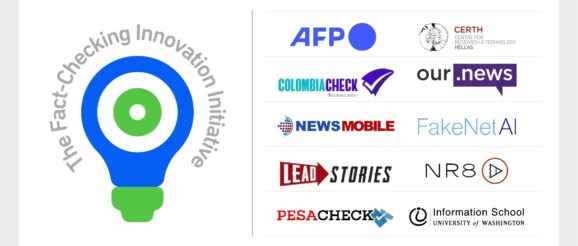The second round of the Fact-Checking Innovation Initiative awards five new projects – Poynter

Five projects focused on how technology can improve fact-checking will receive up to $100,000 in grants as part of the second round of the Fact-Checking Innovation Initiative.
The winners were chosen from a list of 64 proposals and will split a total of $450,000, made possible by a partnership between the International Fact-Checking Network and the Facebook.
“We are committed to supporting innovative research and practices around fact-checking to expand the horizons of our reach and impact for a better information ecosystem,” said IFCN Director Baybars Örsek. “The second round of the Fact-Checking Innovation Initiative with Facebook will provide the resources and network to pursue this goal.”
In February, the first round awarded grants ranging from $30,000 to $70,000 to seven projects based in six countries. The focus was on regional specific challenges and opportunities for fact-checking that could be addressed with either technical or non-technical solutions.
This second round features five partnerships between IFCN Code of Principles Signatories and outside companies and universities expanding the fact-checking community to welcome ideas from other fields of expertise.
“What’s exciting about the Innovation Initiative is that we’re able to support projects that drive innovation and solve problems through joint effort,” said Orlando Watson, from Facebook’s Integrity Partnerships. “We look forward to the positive impact these grant recipients have on the fact-checking ecosystem worldwide”
Grant applicants were evaluated by a 14-member jury of experts from the fields of fact-checking technology and academia. The IFCN is grateful to these jury members for their participation and for helping to choose these five projects.
Read more about the projects below:
PesaCheck + University of Washington (Kenya & USA)
Project: Auditing Social Media for Misinformation
Grant: $ 99,707
Description: The University of Washington is partnering with PesaCheck to focus specifically on coordinated misinformation and disinformation campaigns that have become prevalent in Africa. This project aims to quantify search-based misinformation on social media and create new tools and methods that fact-checkers can use to measure misinformation on the platform.
ColombiaCheck + Our.News (Colombia & USA)
Project: Fact-checking browser extension in Spanish
Grant: $ 63,500
Description: Our.News is an online platform that offers a “nutrition label” for news. This connects users to fact-checks for individual news articles as well as information about the individual news outlets. ColombiaCheck is partnering with Our.News to create a Spanish version to help extend this resource to Latin American and Spanish-speaking audiences.
NewsMobile + FakeNetAI (India & USA)
Project: Detect and Debunk Malicious Deepfakes
Grant: $ 99,000
Description: FakeNetAI currently operates a web application that identifies potentially viral posts and analyzes them to detect the usage of deep fake technology. This partnership will find ways to incorporate FakeNetAI’s technology into the fact-checking process to enable fact-checkers to quickly debunk these claims.
Agence France-Presse + Certh (France & Greece)
Project: EnVisu4 : Enhancing Visual Forensics
Grant: $100,000
Description: This project is aimed at solving the problem fact-checkers have interpreting current visual forensic technology. It will improve the user experience so that fact-checkers can better understand how an image has been altered and communicate that in their fact-checks.
Lead Stories + NR8 (United States)
Project: Fact-checking Videos using AI scalably
Grant: $93,333.34
Description: NR8 has partnered with Lead Stories to help scale its platform that scans social media for videos containing potential misinformation. The platform uses Artificial Intelligence to transcribe, analyze and score each video based on how likely it is to contain misinformation. Human fact-checkers will then be able to use this platform to quickly detect suspect videos, and evaluate whether they contain misinformation.
